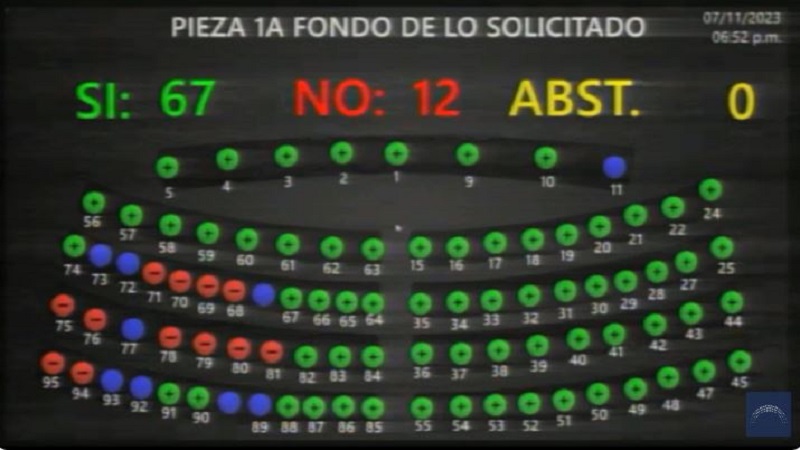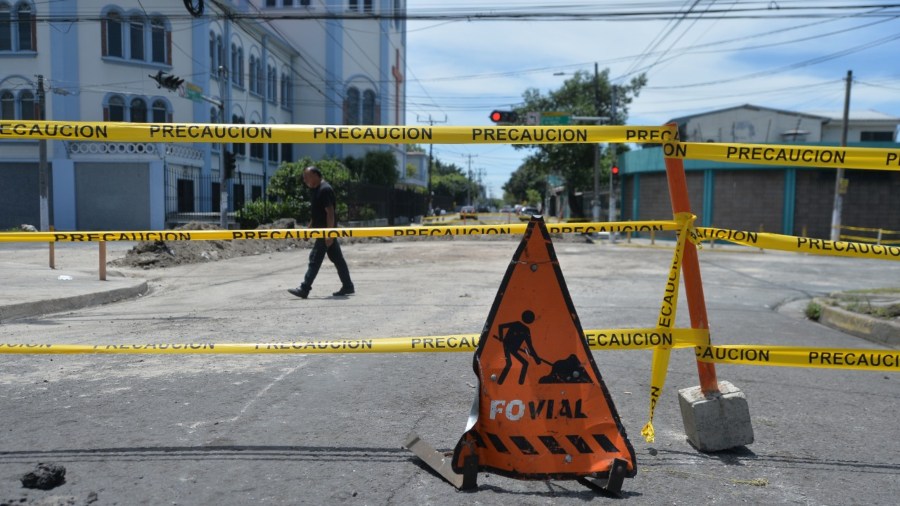The decision was made due to setting a very high interest rate, 14.5%, and low demand from foreign investors for FOVIAL bonds.
El Salvador’s Finance Minister, Gerson Posada, confirmed to the American media that they had submitted a project to sell bonds worth $500 million, to be issued by the Fund for the Preservation of Roads (FOVIAL).
At the end of November, Oppenheimer & Co. It, in cooperation with Banco Atlántida, SA, has prepared a very comprehensive document so that FOVIAL can issue up to $500 million of bonds, in Europe, to achieve the objectives “to repay existing debts and obtain funds for future investments”. The institution was analyzing the demand for the bonds, which will mature within 7 years and have a return of about 14.5%.
According to Bloomberg, the government did not allow the deal because “the terms proposed by the broker (including double-digit returns) were not suitable for the country.” Standard & Poor’s Global published, in a statement on December 4, that FOVIAL bonds received a rating of B-, that is, six levels below investment grade.
Read more: Specialists: Authoritarianism in the country could complicate international finance
Napoleon Campos, a Salvadoran specialist in international relations, believes that this is an example of investors’ lack of confidence in the local government, as a result of the environment of “legal insecurity” prevailing in the country. It resulted from violations of the constitution that enabled Nayib Bukele to run for a second term for the presidency.
“What investors are telling the Salvadoran state is that FOVIAL may have an attractive structure, but we don’t trust you.” So, in order to lend to you, we require returns above 14%.’ “These are really garbage returns,” Campos commented.
Napoleon Campos, expert in international relations
The Government of El Salvador’s position in accessing international financing is complex compared to other countries in the region. There is the case of Costa Rica, which has just provided international debt for 31 years (four times longer than FOVIAL bonds) and at an interest rate of 7.75%, almost half the amount required for the Salvadoran institution’s promissory notes.
“The Costa Rica bid had so many interested parties that the demand exceeded $5,000 million. “There is a completely different scenario than that of El Salvador, from night to day,” explains Campos.

Complex scenario
Salvadoran economist Luis Membrinho believes that another reason for this refusal to offer bonds may be the lack of sufficient demand. In the document that Oppenheimer & Co. provided to potential investors, it was stated that the debt owed by the Salvadoran government with FOVIAL rose from $85.8 million in December 2020 to $187.4 million as of September 2023. This is the sum of the treasury bills (letes) acquired by the facility and the direct loans Provided by Bukele management.
“The numbers show that it is the government that owes FOVIAL. Investors may have thought that to solve their situation, FOVIAL does not need investment, but rather the government that pays it.
On the other hand, in the presentation itself, it can be inferred that the money that was not intended for debt repayment was not intended for a specific investment, such as the construction of a bridge or a street, but rather for the ongoing expenses of the company. institution. “This is the reason for the constant flow of taxes on fuel,” says the economist.
Membrinho points to another situation that could be translated as a violation of the law. According to local regulations, all taxes must first enter the Ministry of Finance and then be transferred to the entity that will implement them. FOVIAL intends for fuel taxes to be transferred directly from gas companies to an account at the Bank of New York Mellon in the United States.
This is because that banking institution will become the custodian managing four accounts. In the first, pooled, all FOVIAL income will be deposited; The second will be used to repay all creditors who will purchase securities issued by FOVIAL; In the third account, there will be a debt service reserve fund equivalent to 4 months of interest and 4 quarterly payments of principal. The remaining funds (after making all the above payments) will be deposited into the Capital Expenditure Account (CAPEX), i.e. for FOVIAL investments.
“The violation of the law from this same structure was a strong indicator of legal insecurity for investors,” Membrinho explains.
On the other hand, a rate of 14.5% was not viable for the institution because part of the $500 million would be used to pay off debts, specifically $142.9 million for the Central American Bank for Economic Integration (CABEI), and $23.5 million for the Mortgage Bank. and a $108.95 million securitization (FTRTFOV04) to a series of national investors. All of these obligations have an interest rate of less than 9%, so taking out debt with a higher interest rate of 5% wouldn’t make sense.
Back to the cover

“Social media evangelist. Student. Reader. Troublemaker. Typical introvert.”

:quality(85)/cloudfront-us-east-1.images.arcpublishing.com/infobae/TEQF6EONZRFGLLLDIDD4L2O4EE.jpg)

:quality(75)/cloudfront-us-east-1.images.arcpublishing.com/elcomercio/XU32LRAEZFDDPNVHLFU3CKVBYY.jpg)



More Stories
Bank of America has taken a drastic measure that could affect thousands of customers
With the effect of lifting, illuminating and moisturizing
$1 bills can cost up to $150,000 due to a printing error